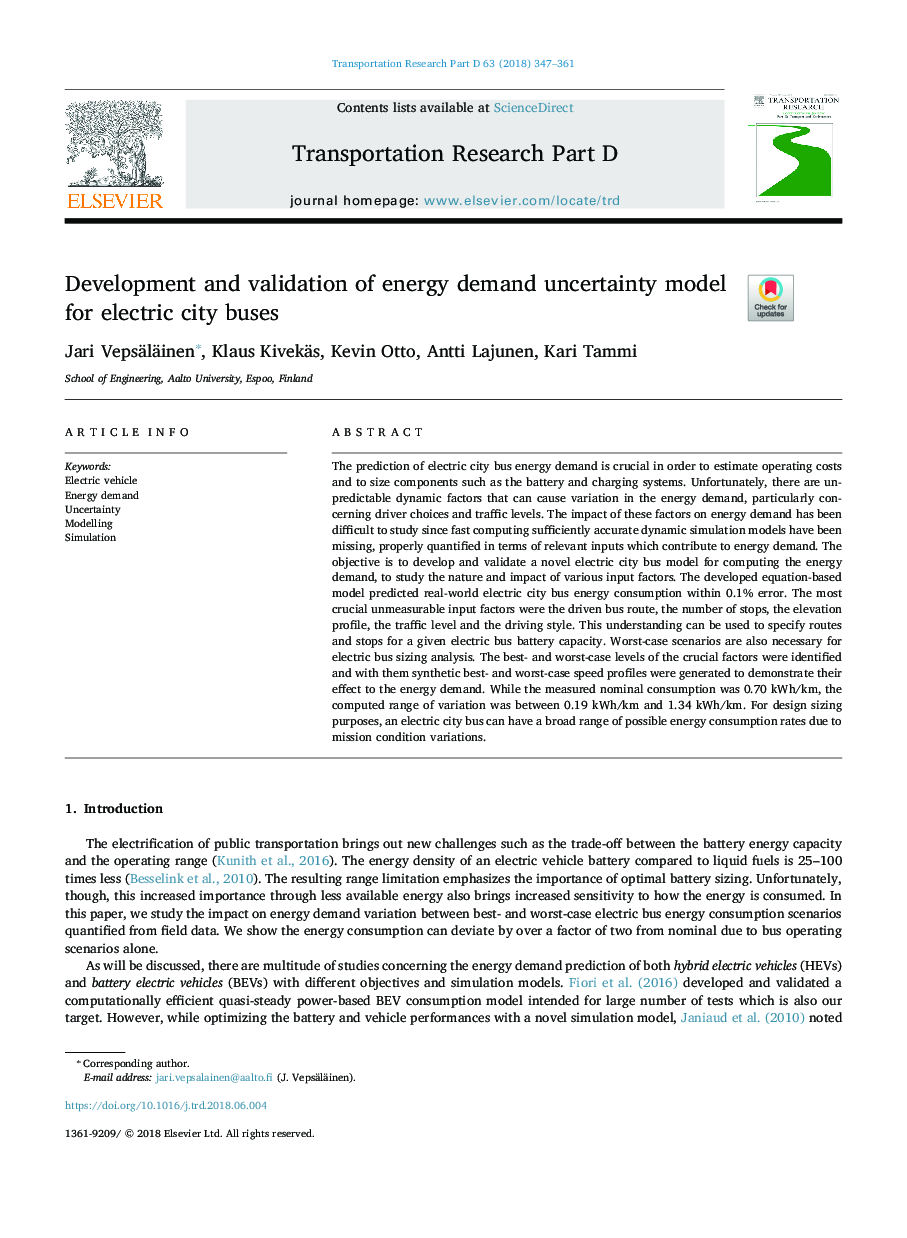| کد مقاله | کد نشریه | سال انتشار | مقاله انگلیسی | نسخه تمام متن |
|---|---|---|---|---|
| 7498439 | 1485860 | 2018 | 15 صفحه PDF | دانلود رایگان |
عنوان انگلیسی مقاله ISI
Development and validation of energy demand uncertainty model for electric city buses
ترجمه فارسی عنوان
توسعه و اعتبار مدل عدم قطعیت تقاضای انرژی برای اتوبوس های شهرستان برق
دانلود مقاله + سفارش ترجمه
دانلود مقاله ISI انگلیسی
رایگان برای ایرانیان
کلمات کلیدی
خودرو الکتریکی، تقاضای انرژی، عدم قطعیت، مدل سازی، شبیه سازی،
ترجمه چکیده
پیش بینی تقاضای انرژی الکتریکی در اتوبوس در شهرستان به منظور تخمین هزینه های عملیاتی و اجزای اندازه مانند سیستم های باتری و شارژ ضروری است. متاسفانه، عوامل پویای غیر قابل پیش بینی وجود دارد که می تواند موجب تنوع در تقاضای انرژی، به ویژه در مورد انتخاب رانندگان و سطح ترافیک شود. تأثیر این عوامل بر تقاضای انرژی دشوار است، زیرا محاسبات سریع مدلهای شبیه سازی دینامیکی دقیق و دقیق از لحاظ ورودی های مربوطه که به تقاضای انرژی کمک می کنند، به اندازه کافی اندازه گیری شده اند. هدف این است که یک مدل اتوبوس جدید شهر الکتریکی برای محاسبه تقاضای انرژی برای مطالعه طبیعت و تاثیر عوامل مختلف ورودی ایجاد و اعتبار دهیم. مدل مبتنی بر معادله مبتنی بر پیش بینی مصرف برق اتوبوس در شهر واقعی در خطای 0.1٪ پیش بینی شده است. مهم ترین عوامل ورودی قابل اندازه گیری، مسیر اتوبوس رانندگی، تعداد توقف ها، مشخصات ارتفاع، سطح ترافیک و سبک رانندگی بود. این درک می تواند مورد استفاده قرار گیرد برای مشخص کردن مسیرها و توقف برای یک ظرفیت باتری اتوبوس داده شده. سناریوهای بدترین حالت برای تجزیه و تحلیل مقیاس اتوبوس برق نیز ضروری است. سطوح بهترین و بدترین موارد عوامل حیاتی شناسایی شد و با استفاده از آنها پروفیل های سریع و ارزان تر مصنوعی برای نشان دادن تأثیر آنها بر تقاضای انرژی تولید شدند. درحالیکه مصرف اسمی مصرفی 0.70 کیلووات ساعت در کیلومتر بود، محدوده تنوع محاسبه بین 0.19 کیلووات ساعت / کیلومتر و 1.34 کیلووات ساعت / کیلومتر بود. برای اهداف طراحی، یک اتوبوس شهر الکتریکی می تواند طیف گسترده ای از نرخ مصرف انرژی ممکن را با توجه به تغییرات شرایط ماموریت داشته باشد.
موضوعات مرتبط
علوم زیستی و بیوفناوری
علوم محیط زیست
علوم زیست محیطی (عمومی)
چکیده انگلیسی
The prediction of electric city bus energy demand is crucial in order to estimate operating costs and to size components such as the battery and charging systems. Unfortunately, there are unpredictable dynamic factors that can cause variation in the energy demand, particularly concerning driver choices and traffic levels. The impact of these factors on energy demand has been difficult to study since fast computing sufficiently accurate dynamic simulation models have been missing, properly quantified in terms of relevant inputs which contribute to energy demand. The objective is to develop and validate a novel electric city bus model for computing the energy demand, to study the nature and impact of various input factors. The developed equation-based model predicted real-world electric city bus energy consumption within 0.1% error. The most crucial unmeasurable input factors were the driven bus route, the number of stops, the elevation profile, the traffic level and the driving style. This understanding can be used to specify routes and stops for a given electric bus battery capacity. Worst-case scenarios are also necessary for electric bus sizing analysis. The best- and worst-case levels of the crucial factors were identified and with them synthetic best- and worst-case speed profiles were generated to demonstrate their effect to the energy demand. While the measured nominal consumption was 0.70 kWh/km, the computed range of variation was between 0.19 kWh/km and 1.34 kWh/km. For design sizing purposes, an electric city bus can have a broad range of possible energy consumption rates due to mission condition variations.
ناشر
Database: Elsevier - ScienceDirect (ساینس دایرکت)
Journal: Transportation Research Part D: Transport and Environment - Volume 63, August 2018, Pages 347-361
Journal: Transportation Research Part D: Transport and Environment - Volume 63, August 2018, Pages 347-361
نویسندگان
Jari Vepsäläinen, Klaus Kivekäs, Kevin Otto, Antti Lajunen, Kari Tammi,
